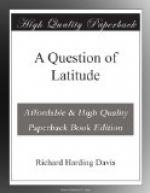When they had gone, all through the sultry night, until the sun drove him to his cabin, like a caged animal Everett paced and repaced the deck. The woman possessed his mind and he could not drive her out. He did not wish to drive her out. What the consequences might be he did not care. So long as he might see her again, he jeered at the consequences. Of one thing he was positive. He could not now leave the Congo. He would follow her to Brazzaville. If he were discreet, Ducret might invite him to make himself their guest. Once established in her home, she must listen to him. No man ever before had felt for any woman the need he felt for her. It was too big for him to conquer. It would be too big for her to resist.
In the morning a note from Ducret invited Everett and Cuthbert to join him in an all-day excursion to the water-fall beyond Matadi. Everett answered the note in person. The thought of seeing the woman calmed and steadied him like a dose of morphine. So much more violent than the fever in his veins was the fever in his brain that, when again he was with her, he laughed happily, and was grandly at peace. So different was he from the man they had met the night before, that the Frenchman and his wife glanced at each other in surprise and approval. They found him witty, eager, a most charming companion; and when he announced his intention of visiting Brazzaville, they insisted he should make their home his own.
His admiration, as outwardly it appeared to be, for Madame Ducret, was evident to the others, but her husband accepted it. It was her due. And, on the Congo, to grudge to another man the sight of a pretty woman was as cruel as to withhold the few grains of quinine that might save his reason. But before the day passed, Madame Ducret was aware that the American could not be lightly dismissed as an admirer. The fact neither flattered nor offended. For her it was no novel or disturbing experience. Other men, whipped on by loneliness, by fever, by primitive savage instincts, had told her what she meant to them. She did not hold them responsible. Some, worth curing, she had nursed through the illness. Others,




